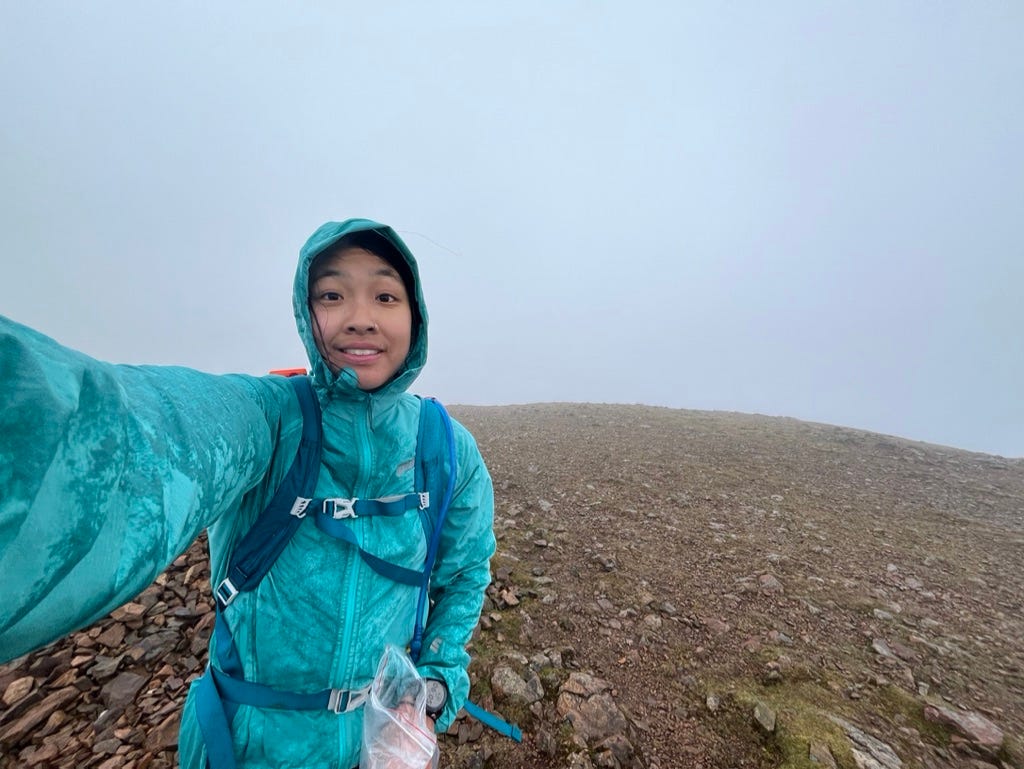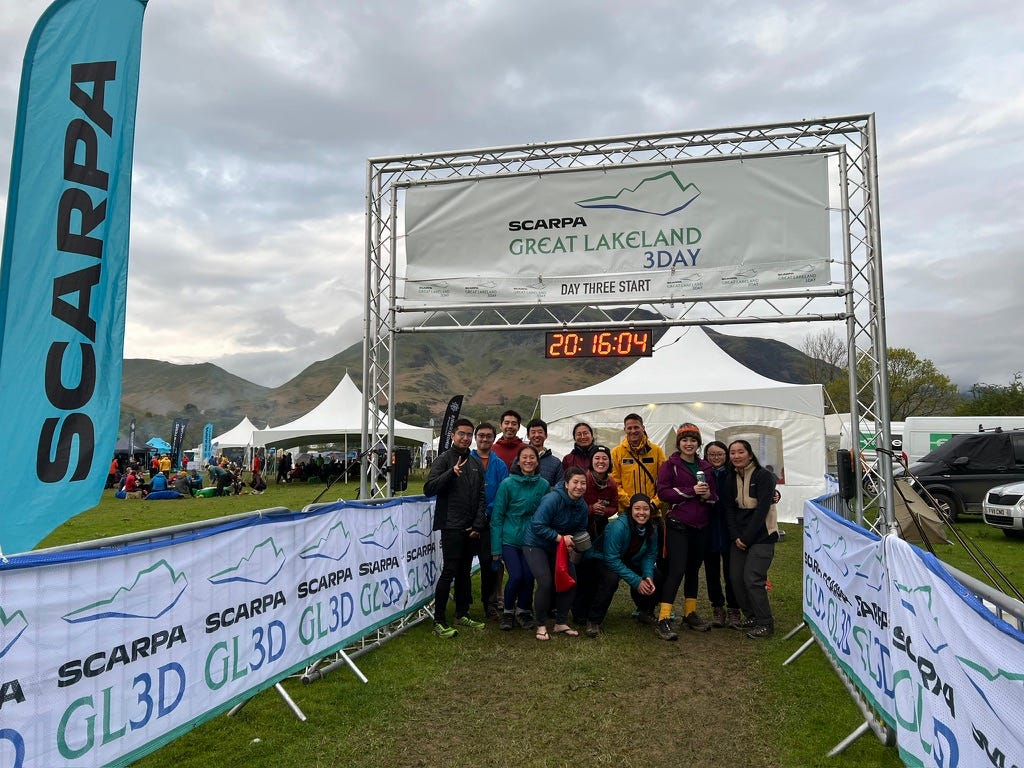Back in May, I had the opportunity to attend the SCARPA Great Lakeland 3Day event. It’s a 4D3N annual fell running event held in the Lake District; something almost like a mix of orienteering and fell running. As a participant, you have a pick of race courses from different difficulty levels, all of which have checkpoints along the way. On the first night, we camped at Ennerdale Show Ground. On the second day, all our belongings were transported to the overnight campground near Buttermere, where we stayed for two nights before ending the race back at Ennerdale on the fourth day. The event’s appeal lies in its flexibility and non-competitive nature that fosters an overall friendly atmosphere.
As part of Ourea Events’ efforts to increase diversity, they contacted groups such as East South East Asian (ESEA) Outdoors and Black Trail Runners. Me being me — someone who loves the outdoors and fits the bill, you bet I jumped at the chance.
I wanted to share and document this event because it’s taken on a special value in my recent memory; for two reasons — namely for being a confidence booster, and for making me feel more belonged in the outdoors — both of which are largely intertwined.
Confidence Booster
Growing up in an urban jungle meant having little exposure to the outdoors. I didn’t know what a valley looked like, let alone be able to read contours. This meant that Charmaine 2 years ago had zero concept of map-reading or any mountain literacy. Naturally, whenever hiking with my friends, I would often feel inferior — thinking that I wasn’t as good as them at map reading or wasn’t as stable on uneven ground. This also subconsciously affected the way I interacted with others — I was more cautious — and refused to push myself on days out, just because I wanted to avoid dragging others down. Whenever there were opportunities to plan hikes or runs, I’d find myself taking a backseat, for fear of suggesting something silly. This inadvertently compromised my learning opportunities — because if you don’t try or make mistakes — how would you learn? But because I felt so inferior, I often felt like I didn’t have a voice in decisions in spaces related to the outdoors.
But when this opportunity came up, I decided to challenge myself. I wanted to feel independent on the hills. I wanted to feel like I didn’t have to rely on others around me. As such, I picked the easier race courses intending to practise my navigational skills and test my ability to run consecutively for 3 days on the hills (something I’ve not done before!).
Things turned out way better than I imagined. There weren’t any logistical nightmares, I didn’t get lost or injured; and more importantly, enjoyed myself thoroughly out there. There was just something liberating about being on the hills by myself. It was just me, the map, and my compass. There was no one to keep up with, and no one to give the right answer to. It was all about experimenting with the tools I had. Most of the time, visibility was really poor. Coupled with how steep some of the contours were, it meant that there was little margin for error. With the constant rain as well, I had to avoid using my phone for the GPS. This meant I found myself having to trust the compass. It was also about trusting my internal compass — something that I gradually got better at throughout the 3 days.
Besides, having had an unpleasant scrambling incident a while ago, I redeveloped my fear of heights, and consequently — of scrambling. I’ve actively avoided scrambling the last year, just because memories of that incident would occasionally flash through my brain. However, some sections of the route involved scrambling on the descent. With the poor visibility, slippery rocks, tired legs, and negative flashbacks, I’d be lying if I said my heart didn’t pound. But when you’re on your own, you know you only have yourself to rely on. Sometimes such a realisation becomes a source of strength and comfort, because — who is going to get you down the mountain, but yourself? More often than not, it just entailed breathing lots and doing positive mental talk (or just repetitive “don’t die”). And whenever I made it down safely, it was another supercharge to my confidence battery.
It’s also the simple things that some take for granted — from pitching your own tent to using an outdoor stove. These were skills I never felt confident in until I was out there by myself. Sometimes, we just need a space we feel comfortable in, to do the things we don’t feel comfortable with.
On Belonging
Participating in this event has also made me realise how deeply intertwined my sense of belonging in the outdoors (or lack thereof) is with my identity. I remember stepping into one of the event tents on the first night, doing a quick scan, and realising that there was not a single person who looked like me. Coupled with the noise levels (something I’m not very good at), I made an instant dash for the exit. This reminded me of all the experiences I’ve had in university — feeling out of place and voiceless in situations that didn’t consciously include the “other”. I’ve been lucky enough not to experience overt racism (so far), but it’s still the casual remarks passed off that ignore the cultural differences, or remarks that assume you-know-it-like-we-do. It’s also remarks that assume you know what kit to have, what map to use, or which town centre to go to because you’ve supposedly grown up in outdoor spaces as well. Most times no one means harm, but it’s when you’re not given the time to verbalise yourself or ask questions that contributes to the cultivation of psychological barriers.
All these unpleasant experiences made the company with other people who looked like me even more special. Even though nothing was verbalised, there was this unspoken understanding — that we knew why we were all there, and that we were all in it together. Despite being the first time meeting everyone in the group, I felt like I had a voice and wasn’t overshadowed by dominant characters that carry an aura of superiority. This also helped to boost my confidence levels. And because I had that belief, I stuck to completing the 3 days by myself. For the first time in a long while, I felt like I belonged in this space. I felt like I was empowered to do the things I loved. Light was shone on the differences between how I used to feel, and how I felt during the event. It all made perfect sense. Because I saw 14 people in a crowd of 800 that looked like me. Perhaps it’s true that sometimes, you just can’t be what you can’t see.
Confidence and belonging are deeply intertwined. This is something that clicked in my head from the point I registered — that societies are divided by class, gender and racial lines, three separate but very intersectional variables. Since 16, I’ve never seen the world in the same rose-tinted way again. And thankfully, I’ve been lucky enough to experience life as both the majority and minority, something that has been extremely formative. To get a taste of what it’s like to be on both sides of the coin. Back in Singapore, it was Chinese privilege. Here in the UK, it’s White privilege. Privilege exists everywhere. It manifests in the status quo that benefits the majority, or those in power. To stay silent is to contribute to the system of “passive oppression”, the oppression that manifests in psychological barriers and the oppression that happens simply because nothing has been done. We often shudder at the “isms” because it makes us feel uncomfortable. It’s uncomfortable because it’s personal. Systemic issues are personal. To call them out, to recognise them — is a step towards reconciling the unequal world we live in.
“We’re all on the hook because there’s no way to avoid being part of the problem. People of colour, the lower working classes, women gay and straight, and gay men are all on the hook everyday. White, heterosexuals, men, are too but they’re more likely to not know it because they have so many ways to act as though they aren’t, and privilege allows them to get away with it. But, the more aware we are of all the ways there are to fool ourselves, the easier it is to become part of the solution.”
— Johnson (2001), from Privilege, Power and Difference
A huge shoutout to ESEA for facilitating this opportunity, and to Ourea Events for its efforts in diversifying the outdoors.





